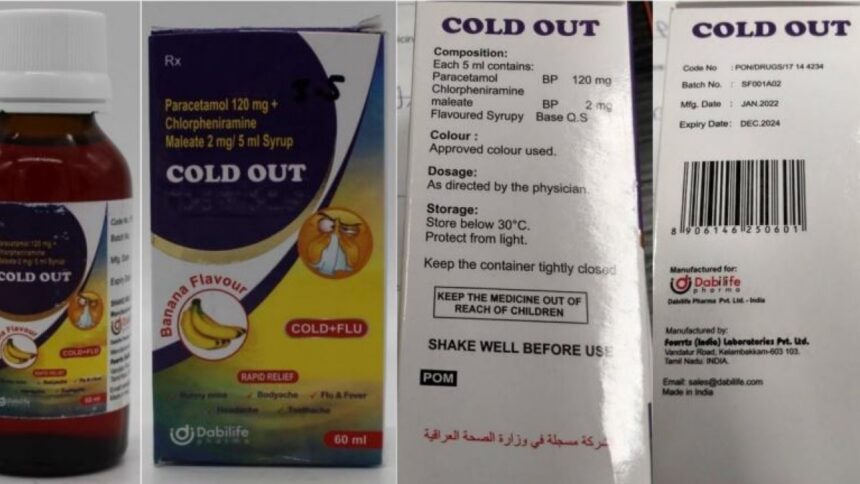The World Health Organization (WHO) on Monday issued an alert over another India-made ‘substandard’ syrup used in Iraq. The common cold syrup, Cold Out, is ‘contaminated’ and is not safe to use, the global health organisation said in its medical alert issued on Monday. The WHO said that a sample of the Cold Out sysup was obtained from one location in Iraq and submitted for laboratory analysis.
“The sample was found to contain unacceptable amounts of diethylene glycol (0.25%) and ethylene glycol (2.1%) as contaminants. The acceptable safety limit for both ethylene glycol and diethylene glycol is no more than 0.10%,” the United Nations agency said.
The syrup was manufactured by Chennai-based Fourrts (India) Laboratories for Dabilife Pharma. “To date, the stated manufacturer and the marketer have not provided guarantees to WHO on the safety and quality of the product,” the alert said, adding that this syrup may have marketing authorisations in other countries or regions.
Highlighting the risk, the WHO said that diethylene glycol and ethylene glycol are toxic to humans when consumed and can prove fatal. “The substandard batch of the product is unsafe and its use, especially in children, may result in serious injury or death,” the alert warned.
“Toxic effects can include abdominal pain, vomiting, diarrhoea, inability to pass urine, headache, altered mental state and acute kidney injury which may lead to death,” the WHO said.
In advice to regulatory authorities and the public, the WHO said: “If you have the affected product, WHO recommends that you do not use it. If you, or someone you know, has, or may have used the affected product, or suffered an adverse reaction or unexpected side effects after use, you are advised to seek
immediate medical advice from a healthcare professional.”
This alert about Cold Out is the latest warning issued in recent months about contaminated cough syrups from India. At least five of the syrups under scrutiny involve Indian manufacturers.
Last year, cough syrups made in India were linked to the deaths of at least 89 children in Gambia and Uzbekistan. The Indian authorities also found violations at Riemann Labs, whose cough syrup was linked to the deaths of children in Cameroon.
The Uttar Pradesh Drugs Controlling and Licensing Authority had canceled the manufacturing license of Noida-based Marion Biotech, which had exported the syrups to Uzbekistan.
The company involved in Gambia, Maiden Pharmaceuticals, denied that its drugs were responsible for the deaths in the country. Later, tests by an Indian government laboratory found no toxins in the syrup. Reuters reported that DCGI (Drugs Controller General of India) chief VG Somani wrote to WHO saying the samples of Maiden’s syrup had not been contaminated with ethylene glycol and diethylene glycol.
(With inputs from Reuters)








